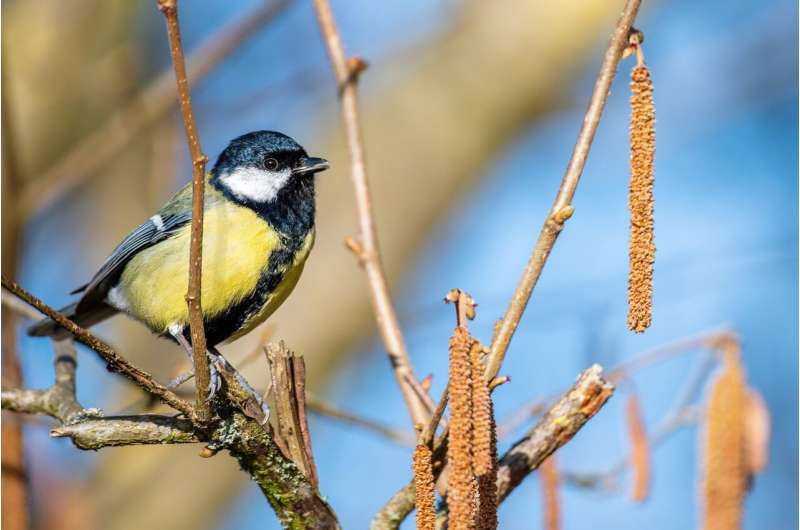This article has been reviewed according to Science X's editorial process and policies. Editors have highlighted the following attributes while ensuring the content's credibility:
fact-checked
peer-reviewed publication
trusted source
proofread
Study predicts songbirds' alarm calls will be impacted by high temperatures due to climate change

An international study has predicted that high temperatures caused by climate change will impact the ability of the common songbird great tits (Parus major) to sound the alarm and scare off predators, potentially impacting the species future. The research was published in Behavioral Ecology and Sociobiology.
Study co-author, Associate Professor Mandy Ridley from The University of Western Australia's School of Biological Sciences, said great tits were highly sensitive to temperature change because they were small, had high metabolic rates and were active in daylight hours.
"We know that climate change is causing heat waves to increase in number and intensity and wanted to understand how the potential impacts on songbird behaviors and the subsequent implications for their survival," Ridley said.
Research Associate and co-author Mylène Dutour from UWA's School of Biological Sciences said great tits had two kinds of alarm calls, with both crucial strategies of communication for alerting other birds to threats from potential predators.
"The 'flee alarm call' is used while a great tit is escaping the threat, to alert other birds to freeze or fly away," Dutour said.
"The 'mobbing call' is a complex call produced when the great tits recruit others to put on a coordinated display of sound and movement to let the predator know that it's been seen."
The study, which also involved scientists from France and Germany, and saw researchers measuring the response to mobbing calls of great tits in forests near Lyon in France over a three month period, found a correlation between elevated temperatures and the songbirds' behaviors.
"As temperatures increased, great tits exhibited a more passive response with their mobbing calls decreasing in volume and intensity," Ridley said.
"The implications of the findings suggest that climate-induced changes in behavior could compromise the songbirds' ability to effectively respond to threats and predators.
"Given that great tits' survival is intertwined with their ability to communicate and respond to danger, understanding the cascading effects of temperature-induced behavioral shifts is critical."
Dutour said the study concluded there was an urgent need to quantify the costs of heat exposure in natural populations, so that scientists could improve their understanding of the context in which animals change their behavior in response to climate conditions.
More information: Marion Cordonnier et al, The impact of high temperatures on bird responses to alarm calls, Behavioral Ecology and Sociobiology (2023). DOI: 10.1007/s00265-023-03354-2
Journal information: Behavioral Ecology and Sociobiology
Provided by University of Western Australia




















